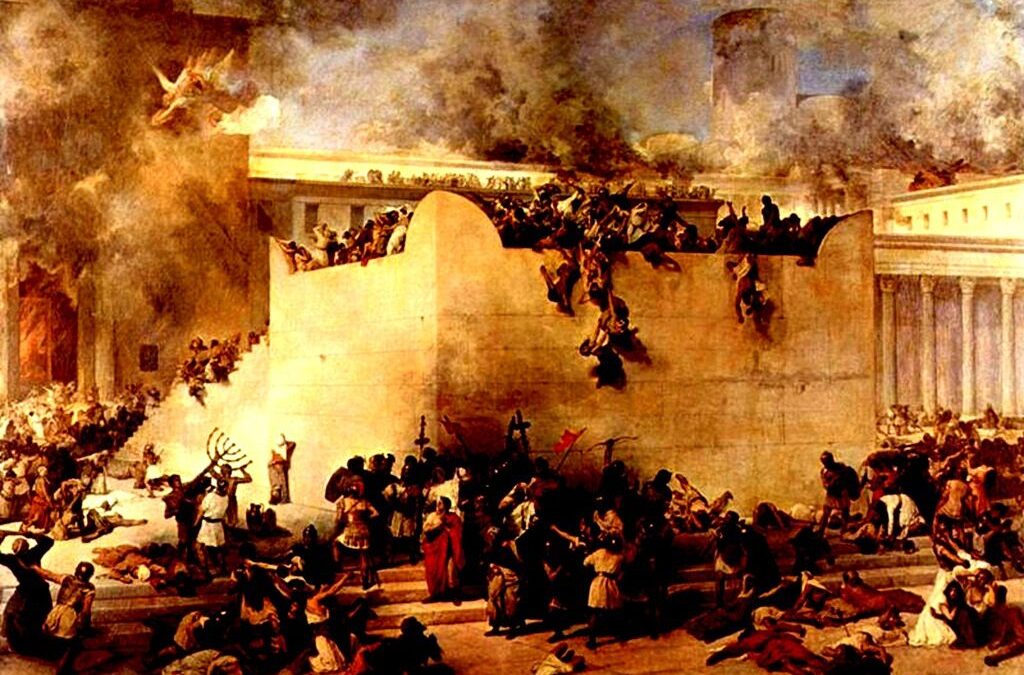
Will the Rapture Be September 23, 2025?
This was the title of a YouTube video. I was surprised because I thought the failure of dispensationalists predicting the rapture for almost 200 years had put an end to this prediction business. Apparently not. This specific video was of a guy shooting down the prediction, which is like shooting fish in a barrel, given the woeful track record of dispensationalist predictions, not to mention the theological errors inherent in it.
We live in a different eschatological world than I did when I first became a Christian in 1978. That was the decade of Hal Lindsey’s The Late Great Planet Earth, a book popular in a way inconceivable to us now. Published in 1970, it eventually sold over 35 million copies by the 1990s, and talk of the rapture and antichrist and Armageddon was everywhere. And world events at the time seemed to lend credibility to the wild speculation. It was all over Christian radio, and popular culture as well. Prophesy conferences were common, as were sermons about it in church. Rapture speculation was common. I’ll never forget one day right before I graduated from college in May 1982 standing out in front of my dorm at Arizona State University praying for the rapture to come so I wouldn’t have to go out into the real world and deal with real life. No such luck! On January 1, 1988, a former NASA rocket engineer named Edgar C. Whisenant self-published a book with the unfortunate title, 88 reasons Why The Rapture Will Be in 1988. We’re still here, by the way.
The frenzy continued into the 90s with the Left Behind series of books, a collection of 16 Christian fiction novels by Tim LaHaye and Jerry B. Jenkins, published from 1995 to 2007. These were turned into a film trilogy from 2000 to 2005, probably the pop cultural apex of “Rapture theology.” (One of the ironies of recent history is that the star of those films, Kirk Cameron, is now a bona fide postmillennialist!) There was even a Left Behind movie in 2014 with Nicolas Cage, although by that time dispensationalism had pretty much run its course. Saying that I do not mean this eschatological perspective on “end times” has gone away, only that it’s no longer a relevant topic of conversation for most Christians. But having said that, dispensationalism hasn’t gone away, only now it’s become the furniture of the Evangelical mind, the background to life that colors how conservative Protestant Christians see things. It’s the assumed eschatology, not much discussed or debated, except maybe on social media. If you asked most Christians if Jesus is coming back soon, or any moment, or if the world is going to get increasingly worse, they would likely say yes. They are familiar with antichrist, rapture, and 666, but don’t much think about it or come across it in church or Christian culture.
Most Christians also live a kind of dualistic pietistic Christianity which fits perfectly with their dispensational assumptions. Christianity is primarily about saving souls, going to heaven when we die, and personal holiness. All of this is predictable given how modern Evangelical Christianity developed over the last two hundred years as the offspring of the Second Great Awakening and the fundamentalism to which it gave birth. For those who are younger among us, they’ve likely never heard conservative Christians referred to as “fundamentalists,” only as Evangelicals. Here’s a brief history as to why.
The word fundamentalist or fundamentalism today is rarely if ever used to refer to conservative Protestant Christians because of 9/11. The words were regularly used to refer to Islam and Muslims, and the angry “New Atheists” tried to slap that label on us in their short stay in the pop cultural sun, but it didn’t stick. In due course conservative Christians were always referred to as Evangelicals. This was a fascinating development for me because when I became a Christian, fundamentalists were a subset of conservative Christianity because of the modernist-fundamentalist controversies of the early 20th century. Evangelicals were a separate subset. This break came after World War II when a small group of Christian leaders, including Billy Graham, wanted to break out of the cultural and intellectual insularity of fundamentalism. They founded Christianity Today and Fuller Theological Seminary, and would only refer to themselves as Evangelicals. After I discovered Francis Schaeffer in college I was ever thereafter an Evangelical. Now we all are.
Why the Rapture?
As I said, most Christians assume dispensational eschatology, and that we are in the “end times,” but few know where it came from or why it exists. Sadly, Christians are as woefully ignorant of history as most Americans, and dispensationalism is one of the defining theological characteristics of modern Evangelicalism nobody knows about. If you want a solid history of its development and demise, I would suggest Daniel G. Hummel’s excellent book, The Rise and Fall of Dispensationalism. I was only vaguely aware of some aspects of this development, and Hummel filled in all the blanks. Before we get to the rapture, I’ll briefly give you my synopsis.
Hummel doesn’t do this, but I would place the start of dispensationalism with the rise of Pietism among German Lutherans in the 17th century. From there Pietism, a dualistic form of spirituality, spread throughout Europe, especially with Wesley in England and Whitfield in America, as well as the Puritans in the First Great Awakening. In the 1830s out of the dynamics of these religious movements, a group of British and Irish dissenters, the most prominent among them J.N. Darby, came up with a novel idea of biblical dispensations, eventually to be called dispensationalism in the 1920s. Until then they were called the “new premillennialists” because their version of eschatology was very different from what thereafter came to be called historic premillennialism. They were also known as the Plymouth Brethren, after the city in England where they had their biggest gatherings. Probably the first real eschatological pessimists, they believed the church was so corrupted that God’s judgment was coming on the world because of it, and likely soon. Their theology developed over time, but became dominant with C.I. Scofield (1843-1921) and his bestselling Reference Bible.
What really ramped up the growth of dispensationalism were Darby’s visits to America from 1862-1877, seven times in all, encompassing a total of seven years. The new premillennialism made its greatest impact through the great evangelist of the 19th century, D.L. Moody (1837-1899). He and American revivalism would never be pure enough for the pessimistic Darby, but his teachings through the Plymouth Brethren came to dominate American Evangelical Christianity. According to Hummel speaking of Moody:
His premillennialism helped to popularize some of the key points as taught by Brethren and early American converts, including the imminent rapture and heavenly nature of the church.
As a successful businessman, Moody was an organizer, and it was the network he built that moved the new premillennialism to the center of Northern Evangelical culture, which continued into the fundamentalism of the 20th century, north, south, east, and west.
The connection between revivalism and this new pessimistic eschatology can’t be overstated. Hummel states it well:
These two implications of Moody’s ministry—the popularization and fusion of new premillennialism with revivalism—could hardly be separated. They worked together to form a potent and wildly successful message. Moody’s ministry spearheaded an interdenominational evangelical ethos shot through with the influences of the new premillennialism.
The Civil War played no small part in that. Given the death and destruction and horror, it wasn’t a stretch to believe that Jesus would be coming back soon to rescue his church. Moody’s version of the new premillennialism was a simple one: “Jesus could come at any moment, and you don’t want to be left behind.” For Moody the Pietist revivalist, the details of doctrine were not that important. And doctrine was divisive and only got in the way of what was most important—soul saving. What mattered in life and Christianity was whether you were going to heaven or hell when you died. Then once you were scared into eternal life with Jesus, what counted was living “the higher life” and personal holiness, and victorious Christian living. It was a potent message for me in 1978. In fact, an experience of what I call “drive by evangelism” was instrumental in bringing me to Christ. One evening at a party not long before I was leaving for college, a buddy of mine and I were outside of a party having a smoke, and a VW bug, the old school one in those days, parks across the street, and a guy gets out of the back seat and walks over to us. I think he’s going to shoot us or something, and he says, “If you died right now would you go to heaven?” I did not want to go to hell when I died, so soon thereafter when I went to college I was praying “the sinner’s prayer.”
The Rapture and Its Predictions
If we’re talking about the Rapture, it will help to know what dispensationalists actually believe about the primary doctrine that defines their eschatology. Hummel here is helpful.
The close of this dispensation will be heralded by the imminent rapture, a sudden taking up into heaven of all true Christians to meet Jesus in the air (based on I Thess. 4:13-17). With the church removed from the earth, God will unleash judgments for seven years as part of the plan for world redemption. God will allow evil to reign and will permit the rise to power of the antichrist, a perversion of Christ’s incarnation that sees Satan fuse with the human dictator of a one-world government. Plagues, geopolitical machinations, and wars will ensue—the earth will be utterly devastated. Israel, God’s chosen people and instrument for world redemption, will be seemingly on the verge of destruction, but a remnant will find supernational preservation. At the climax of the seven years, the battle of Armageddon will see the victorious raptured church, led by Jesus himself, vanquish the forces of the antichrist. Satan will be bound for a thousand years; this is the same span of time that the millennial kingdom will reign in Jerusalem, its realm the entire globe, its rule one of peace and justice. A final confrontation with Satan after the thousand years will dispatch the devil forever into the lake of fire and prompt the final judgment of humanity.
The doctrine of the Rapture, if we can call it that, developed from Darby’s theological assumptions, most importantly his view of the church. First, he saw the church of his day as a corrupted body, and its ruin would be the precursor to the second coming. This was in contrast to what he considered the perversion of postmillennialism that saw organized Christianity ushering in a millennium of peace. Most importantly, he separated ancient Israel from the church. The Hebrews or Jews in ancient Israel were in no way connected to the New Testament church. Christians were citizens of heaven, but the kingdom of heaven on earth, a reign of peace could only ultimately come through Israel.
The details of this theology were worked out throughout the 19th century, but especially with Scoffield and his reference Bible. Old and new premillennialism intermixed in this development, but the rapture was an early feature. As it moved to America even prior to Darby’s visit, the Millerite movement led by Baptist minister William Miller got into the prophecy speculation business, and declared that Jesus would return (often associated with a rapture like event) on October 22, 1844. When it didn’t happen it came to be known as the Great Disappointment, but it would only be the first of many disappointments. Before this September 23 predication popped out of the dispensational rabbit hole, the last modern prediction was from Harold Camping who predicted the Rapture on May 21, 2011, followed by a revised date of October 21, 2011, after the initial failure.
It is impossible to know exactly how many of these predictions happened over the years, but once a rapture like event entered the Evangelical bloodstream seeing world events as indicating some kind of apocalyptic end was a common occurrence, even if most Christians didn’t get into the prediction business. This dispensationalism mentality, the pessimistic the “we lose down here” perspective of life on this fallen earth, in the words of John McArthur, is the worldview of almost all Evangelical Christians. To one degree or another, they all share it regardless of their eschatological convictions or knowledge. That was my perspective most of my Christian life until I embraced postmillennialism just over three years ago. Things were inevitably going to get worse until eventually they got so bad Jesus would have to come back and save the day.
The Rapture and Futurism
Fundamental to dispensationalism and the rapture mentality is futurism, or the idea that the prophetic texts in the Bible refer to events in the future, not to any historical proximity in which they were written. There are three basic eschatological assumptions regarding prophecy and timeline, futurism being one. The others are historicism, which correlates prophecy to historical events, so for example, to the Reformers the Pope was the antichrist, and preterism, which says the events of prophecy happened in the past. The most solid biblical case can be made for a mixture of preterism and futurism. Some Christians have decided that it’s either all preterism or all futurism, but those lead to all kinds of problems, as we can see from Darby and the dispensationalism his thought eventually gave birth to.
For most of my Christian life I was a futurist, but I didn’t even know the term, nor had I ever heard the word preterism, which just means past in Latin. I’ll never forget one morning walking into our bedroom as my wife was reading about the Olivet Discourse in Matthew 24 or Luke 21, and understandably confused, she asked me some questions. I remember being just as confused and replied, “Oh well, who knows. God does.” That was typical of my pan-millennialist tendencies, that it will all work out in the end, so why bother with it. Then the most repeated month in my writing happened, August 2022, and postmillennialism dropped out of the sky on my head. For some reason I read this title of a James White sermon on YouTube, “My Journey to Hope for the Future,” and downloaded it on my trusty little MP3 player. Steve Bannon had turned me into an optimist, but I had no substantive theological reason for it, until I heard this sermon.
I hadn’t realized until these last few years that my basic pessemism about the present and future was due to futurism and its assumptions. Kim Riddlebarger, a scholar and pastor for many years, is a perfect example of why. He is not at all a fan of an optimism/pessimism paradigm, as he argues in a piece he wrote some years ago, and part of the reason is his furutistic reading of Matthew 24:
Jesus himself speaks of world conditions at the time of his return as being similar to the way things were in the days of Noah (Matt. 24:37-38)—hardly a period in world history characterized by the Christianizing of the nations and the near-universal acceptance of the gospel associated with so-called optimistic forms of eschatology.
This is only true if Jesus is referring to his own second coming at the end of time, not the coming judgment on Israel in AD70 he is in fact talking about. In Matthew 24 Jesus has told the disciples while they were standing on the Mount of Olives looking at the magnificent temple, “Truly I tell you, not one stone here will be left on another; every one will be thrown down.” That was shocking, so they ask: “when will this happen, and what will be the sign of your coming and of the end of the age?”
Every futurist, which is the vast majority of Christians, assume the coming Jesus is talking about is the second coming, the end of time and the consummation of all things, and the age is this fallen world system. But Jesus says clearly that is not what he’s talking about: 34 “Truly I tell you, this generation will certainly not pass away until all these things have happened.” It takes all kind of pretzel logic to claim “this” doesn’t mean “this,” but that hasn’t kept Christians from doing it because they come to the text with their futurist assumptions, like Kim, and have to say it doesn’t really mean “this.” When I was confused, I figured some of what Jesus said referred to the generation he was speaking to, and some didn’t, but that was pretty much arbitrary.
Even though plenty of Christians were futurists throughout Christian history, it wasn’t until Darby and his novel dualisms of the church being heavenly and not earthly, and the church and Israel, that his potent pessimism became a feature of Christianity. His theology informed by his futuristic assumptions enabled rapture theology to blossom into dispensationalism that would eventually envelop almost the entire Evangelical church. Thankfully, there will be no rapture on September 23 because Christ did not call his church to escape the world, but to overcome and transform it. As Jesus taught us to pray, “Thy kingdom come, Thy will be done in earth, as it is in heaven.”




Recent Comments